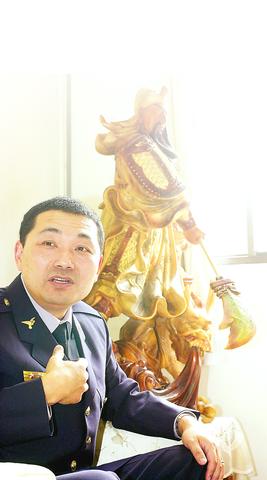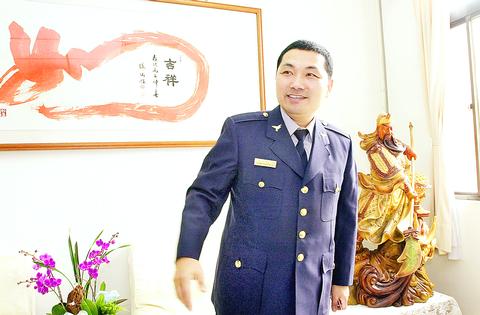Taoyuan Police Chief Hou You-yi (侯友宜) is a short, 42-year-old man. Upon seeing him, his size surprised me a little, but only because it conflicted with his immense reputation as Taiwan's most revered police officer. Almost comically, my initial impression of the man intensified upon entering his office, which like those of many government officials is drastically oversized to accommodate visitors. Strapping and stocky perhaps, but physically, he is not nearly as big as his deeds. It is hard to imagine him dragging a shot and bleeding McGill Alexander, a man possibly twice his size, to safety while under the guns of Chen Chin-hsing (陳進興), the most notorious criminal Taiwan has seen since martial law.
When my editor and I paid Hou a visit, he was in a buoyant mood. Led by an aide who apologized for Hou's busy schedule, we preceded him to the sofas in front of his desk. Hou followed shortly, sharp as a tack in his blue and brass, two stars over his right breast pocket. He offered firm handshakes and laughed from his belly as he greeted us.

PHOTO: GEORGE TSORNG, TAIPEI TIMES
The occasion for our visiting Hou was to hear his version of the 1997 hostage crisis, in which Chen made hostages of Alexander and most of his family. Memories of that time were revived by last December's release of Alexander's book, Hostage in Taipei, which provides a captive's view of the drama. Having read the book, we also wanted to hear Hou's story, because, as the hero of the affair and the man in charge, he could best explain what went right and what went wrong as the events of the hostage crisis unfolded.

PHOTO: GEORGE TSORNG, TAIPEI TIMES
Before Hou had arrived outside the Alexander home, a gunfight had already taken place between Chen and police forces. Describing the scene as near chaos, Hou said: "The first thing I did -- I took one look and told everyone to calm down and not to make any moves."
Then he said he found the officer in charge and questioned him to learn how many people were inside the home and who the hostages were. After that, he took over command as the most senior officer on the scene and asked for a phone to call Chen.
The drama of that night, Nov. 18, 1997, was the climax of an eight-month crime spree that began when Chen and two partners in April abducted and murdered Pai Hsiao-yen (
Wielding three pistols, Chen secured Alexander, his wife, two daughters and adopted infant son (a third daughter was not at the home that night), then waited for the police to zero in. When word got out that Chen was cornered, both police and media flocked to the scene in droves.
Over the phone, Hou introduced himself by name and rank. He wanted to establish "a mutual understanding" with Chen. Hou, who at the time was a section chief at the Criminal Investigation Bureau (CIB,
More importantly, Hou listened to Chen. "He had a lot to complain about," Hou said. "We talked for about 40 minutes, and after that, the situation had stabilized." That is, until the SWAT team went probing around the apartment's back door.
Addressing the SWAT team's move, Hou said that the effort was not coordinated with other police units, and it was at this point that problems arose. While making the probe, the SWAT team inadvertently alerted Chen to their presence, setting off a new and wild volley of shooting. In Chen's frenzied spray of bullets, Alexander and his daughter Melanie were wounded.
"Why did the Alexanders' get injured? There were too many units involved," said Hou. "There was the local precinct police, detectives from the Criminal Investigation Bureau, military police, First Peace Preservation Police [Taiwan's riot police]. In all, there were at least 600 or 700 officers."
"I started yelling [during the gun battle], but there was no way to control it ? Melanie gave a loud cry, and at that point I thought it was all over. I've had experience with gunshot wounds, and I knew that if you don't get victims to the hospital within half an hour, they might be beyond medical care."
Hou said he first restored calm among the officers outside the home and then called Chen to ask who had been hurt. Sounding apologetic, Chen said he had accidentally shot the father, McGill Alexander, and a girl, Melanie, and that the two needed medical attention. Hou turned down an initial request by Chen to send in nurses, saying that the injured needed to go to a hospital immediately.
"It was time to make a decision. I couldn't order anyone else to go in, and if I asked my superior officer to let me go, he wouldn't dare make that decision, because if I went in and got killed, he would be responsible."
Recalling those moments, Hou laughed, as he often did during his long and animated account. It was an odd juxtaposition of time and mood -- a friendly chat in a sunlit office, some garbage truck music piping off in the distance. "There was no choice," he went on. "It wasn't bravery, it was just a decision."
McGill Alexander has said otherwise. In his book, Alexander wrote of Hou's rescue: "I believe that was the bravest act by any man that I have ever witnessed."
When I brought up Alexander's assessment, Hou deflected the flattery, saying simply, "the first thing Alexander said to me was, 'save my daughter.'"
Hou contacted Chen, who agreed to allow Hou inside the home to bring out the injured hostages on the condition that he bring no weapons with him. Once inside, Chen frisked Hou for weapons and when he felt an object in one of the officer's pockets, Chen panicked and angrily put a gun to Hou's head. Hou frantically reassured Chen that the object was merely a cellphone and defused what he describes as the most tense moment of his one-man rescue operation.
Hou secured the release of McGill Alexander and his daughter and helped set the stage for the end of the affair. After the rescue, the hostage crisis concluded fairly smoothly, though it dragged on for a considerable time. Chen was allowed to see his wife and Frank Hsieh (
Putting the matter in historical perspective, Hou said: "Before this case, Taiwan police never had a situation involving hostages and negotiations."
He went on to point out the various problems of the crisis, including the bedlam at the scene, the involvement of the media, the telephone interviews Chen gave to radio and TV stations for most of the night, the crowds of reporters and photographers that blocked access to ambulances.
Once Chen was incarcerated, preventing a repeat of these problems became a paramount concern for Hou and Taiwan's police administration. The result, said Hou, was the establishment of a hostage crisis unit established as part of the CIB. The unit's foundations were laid with visits by Hou and other officials to the FBI (Federal Bureau of Investigation) in the US. From the FBI's basic model, new protocols and procedures were developed. According to the new system, responsibility at the crime scene is distributed among trained specialists, including an officer in charge of controlling the scene, primary and secondary negotiators, a media spokesman, and a rescue team.
Hou says the Chen affair left an indelible mark not only on the police, but on society as a whole. It marked the point at which Taiwan came face to face with the dark side of its post-martial law freedoms.
"Taiwan had never encountered a criminal and sexual offender like Chen Chin-hsing," he said.
Many saw crime in 1997 -- exemplified by the Pai murder, the hostage crisis, and a string of other atrocities carried out by Chen between these events -- as irrefutable evidence of major social decay in Taiwan. "[The Chen affair] attracted the attention of the entire nation, and everyone watched it like a drama," said Hou. "In this case, each and every member of the populace felt like they had played their own roles."

Taiwan has next to no political engagement in Myanmar, either with the ruling military junta nor the dozens of armed groups who’ve in the last five years taken over around two-thirds of the nation’s territory in a sprawling, patchwork civil war. But early last month, the leader of one relatively minor Burmese revolutionary faction, General Nerdah Bomya, who is also an alleged war criminal, made a low key visit to Taipei, where he met with a member of President William Lai’s (賴清德) staff, a retired Taiwanese military official and several academics. “I feel like Taiwan is a good example of

March 2 to March 8 Gunfire rang out along the shore of the frontline island of Lieyu (烈嶼) on a foggy afternoon on March 7, 1987. By the time it was over, about 20 unarmed Vietnamese refugees — men, women, elderly and children — were dead. They were hastily buried, followed by decades of silence. Months later, opposition politicians and journalists tried to uncover what had happened, but conflicting accounts only deepened the confusion. One version suggested that government troops had mistakenly killed their own operatives attempting to return home from Vietnam. The military maintained that the

Before the last section of the round-the-island railway was electrified, one old blue train still chugged back and forth between Pingtung County’s Fangliao (枋寮) and Taitung (台東) stations once a day. It was so slow, was so hot (it had no air conditioning) and covered such a short distance, that the low fare still failed to attract many riders. This relic of the past was finally retired when the South Link Line was fully electrified on Dec. 23, 2020. A wave of nostalgia surrounded the termination of the Ordinary Train service, as these train carriages had been in use for decades

Lori Sepich smoked for years and sometimes skipped taking her blood pressure medicine. But she never thought she’d have a heart attack. The possibility “just wasn’t registering with me,” said the 64-year-old from Memphis, Tennessee, who suffered two of them 13 years apart. She’s far from alone. More than 60 million women in the US live with cardiovascular disease, which includes heart disease as well as stroke, heart failure and atrial fibrillation. And despite the myth that heart attacks mostly strike men, women are vulnerable too. Overall in the US, 1 in 5 women dies of cardiovascular disease each year, 37,000 of them